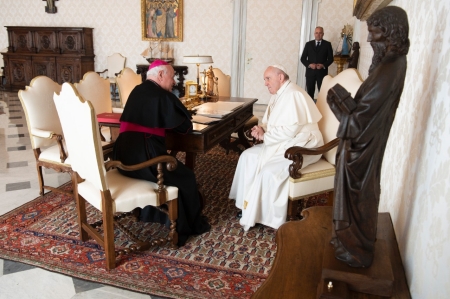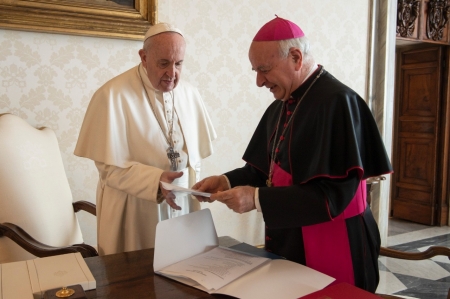Pandemic and Universal Brotherhood

Vatican City, March 30th.- Archbishop Vincenzo Paglia, academy president, gave Pope Francis a copy of the text during a private meeting in the Apostolic Palace March 30. "The pope confided in me two of his concerns: how to help right now, especially the weakest; and for the future, how to come out of this (crisis) strengthened in solidarity," including on a global level, the archbishop said in the written statement.
(Photo: courtesy Vatican Media)
The Pontifical Academy for Life, which by its institutional mandate promotes and supports the alliance between science and ethics in a search for the best possible humanism, wishes to contribute its own reflections. Its intent is to locate certain elements of this situation within a renewed spirit that must nourish social relations and care for the person. The exceptional situation that today challenges the brotherhood of the humana communitas must finally transform itself into an occasion for this spirit of humanism to influence institutional culture at a regular pace: within individual peoples, and in the harmonious bonds between peoples.
(...)
The risk of a global epidemic requires, in the context of responsibility, the introduction of global coordination in health care systems. Be aware that the strength of the process is determined by the weakest link, in terms of speed of diagnosis, rapidity of reaction and proportionate containment measures, adequate structures, systems for record keeping and ability to share information and data. It is necessary that the authorities who can deal with emergencies comprehensively, make decisions, and orchestrate communications, can also be relied upon as reference points to avoid the communication storms that have broken out (“infodemia”), with their inexact data and the fragmentary reports.
(...)
In this scenario, particular attention should be paid to those who are most fragile, and we are thinking especially of the elderly and people with special needs. All other things being equal, the lethality of an epidemic varies in relation to the situation of the affected countries—and within each country—in terms of available resources, the quality and organization of the health care system, living conditions of the population, the ability to know and understand the characteristics of the phenomenon and to interpret information. There will be more deaths where already in everyday life people are not guaranteed simple basic health care.
This last consideration, too, on the greater negativity faced by the most fragile, urges us to pay a great deal of attention to how we talk about God's action in this historical crisis. We cannot interpret the sufferings that humanity is going through according to the crude scheme that establishes a correspondence between “lèse-majesté” against the divine and a “sacred reprisal” undertaken by God. The mere fact that in such a scenario the weakest would suffer, precisely those whom He cares for the most and with whom He identifies (Mt 25:40-45) forestalls contradict this possibility. Listening to Scripture and the fulfillment of the promise that Jesus accomplishes shows that being on the side of life, just as God commands us, is made real through gestures of humanity for “the other.” Gestures that, as we have seen, are not lacking in these days.
Every form of solicitude, every expression of benevolence is a victory of the Resurrected Jesus. Witness to this is the responsibility of Christians. Always and for everyone. At this juncture, for example, we cannot forget the other calamities that affect the most fragile, such as refugees and immigrants, or those peoples who continue to be plagued by conflict, war and hunger. (...)





